Birmingham Black Bottom: The First All Black Cast Talkies (2003) is the "packaging" title for four early talkies, the first sound films made for distribution to African American neighborhood theaters.
They're short comedies with a bit of music & even less dancing, reliant on good acting, decent scripts, & comical situations.
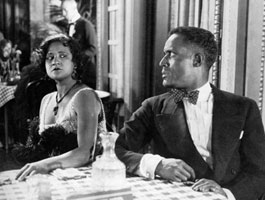 Each film purports to be set in a neighborhood of Birmingham, Alabama, & feature a very quickly recognizable acting troupe whose members take turns at starring roles & support roles through the four films. Each film purports to be set in a neighborhood of Birmingham, Alabama, & feature a very quickly recognizable acting troupe whose members take turns at starring roles & support roles through the four films.
The stories are based on tales from Octavus Roy Cohen's "Darktown Birmingham Stories" that were a recurring feature of The Saturday Evening Post.
The magazine stories pander to white readers' ideas of what black folk were like. The tales were in fact the inspiration for the Amos & Andy radio show.
Yet with a first-rate comedy-film production team & excellent comedy actors, considerable humanity is invested in these adaptations, undermining the potentially demeaning attributes.
The performers were hired from among the Lafayette Players Stock Company of Harlem, & they are just way above the average in talent.
The one actor who did not come to the project out of the Lafayette Players was Spencer Williams who already worked for the studio, at first as an audio technician, but soon as a scenarist/screenwriter & actor.
His close working relationship with studio owner Al Christie is almost certainly the reason the studio began making black-cast films.
Spencer would become one of the most significant of black-cast film directors, screenwriters, & actors. His impact lasted into the television era began & he played Andy of The Amos & Andy Show (1951-1952), in which some of the Lafayette Players also had their last filmed roles.
In the midst of the Civil Rights struggle of the same decade, Spencer unfortunately took some guff from the community for portrayal of Andy, but changing times aside, his work for the show was brilliant in its comic delivery.
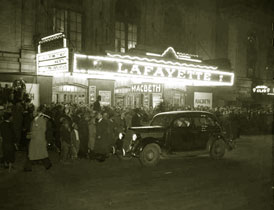 The Lafayette Players were a serious part of the Harlem Renaissance. They were founded in the 'teens with the express purpose in mind of showing black actors doing serious theater. The Lafayette Players were a serious part of the Harlem Renaissance. They were founded in the 'teens with the express purpose in mind of showing black actors doing serious theater.
Eventually they consisted of four troupes, the original at the Lafayette Theater in Harlem, another troupe in Chicago, a third group that travelled the south, & another that travelled up & down the eastern seaboard.
They played mostly to black audiences but whites were welcome too, except in many of the segregated southern theaters, & the intent was to show both black & white audiences that black actors could do serious work.
It may have a big compromise when movie opportunities arose, but only if they would play lowbrow or stereotyped characters.
Which is not to say the Lafayette Players never did vaudevillian sketches; they came well-versed in comedy as well as drama, & only too bad they weren't sought out for a bit more of the latter. They doubtless counted themselves lucky to be able to do something for the movies that wasn't just tapdancing & banjo-playin'.
Even if the project wasn't ideal, it remained that great performers were able to "smuggle" even into white scripts depths & attitudes meaningful to black experience.
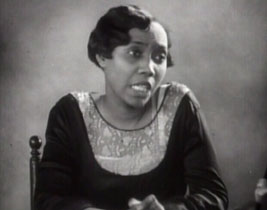 Music Hath Harms (1929) was the only one of Octavus Cohen's "Darktown" stories directed by C. Walter Graham rather than Arvid E. Gillstrom.
Music Hath Harms (1929) was the only one of Octavus Cohen's "Darktown" stories directed by C. Walter Graham rather than Arvid E. Gillstrom.
Graham had been a silent film scenarist & director mostly working on comedies, his career declining then ending after Al Christie's film studio went bankrupt during the Depression.
Behind the opening credits for this two-reeler is a superior jazz-singin' gal (Robert Hyson, backed up by Mosby's Blue Blowers) singing:
"Taint so. Taint so/ Talked to the Lord & the Lord say no/ It ain't so, oh honey, taint so..."
The story opens in a pleasant neighborhood bar & cafe, with a pool table. The place is called Bud Peagle's Barbecue Lunch & Poolroom.
Roscoe Griggles (Spencer Williams) claims to be a famous cornet player, though no one's ever heard of him.
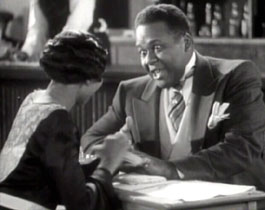 He's got a major crush on Zenia Sprowl (Hyson) who hopes to set herself up in a beauty shop business if she can raise five hundred dollars to get started. He's got a major crush on Zenia Sprowl (Hyson) who hopes to set herself up in a beauty shop business if she can raise five hundred dollars to get started.
Boastful Roscoe tries to evade "proving" he's a cornet player. But when he's practically bribed to give a special two-song performance for a whopping $500 fee, he wants to get that money for the sake of Zenia. Problem is, he doesn't actually know how to play the cornet.
Willie Trout (Harry Porter) is a fine musician who conspires to help Roscoe out. He'll hide under the bandstand while Roscoe mimes playing his instrument.
Villainous Florian Slappey (Harry Tracy) overhears the plot. Having a grudge against Roscoe, he works out a way to get even.
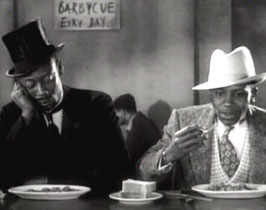 Florian is a recurring character in the Octavus Roy Cohen's Darktown short stories, & not invariably a bad guy, more of a well-dressed dandy, man-about-town, & even occasionally a private detective. But for this tale he serves as a mild sort of villain. Florian is a recurring character in the Octavus Roy Cohen's Darktown short stories, & not invariably a bad guy, more of a well-dressed dandy, man-about-town, & even occasionally a private detective. But for this tale he serves as a mild sort of villain.
On the night of the concert, Roscoe dressed in an Emperor Jones costume conducts his own little band (which is played by Curtis Mosby's band).
It's nearly time for Roscoe's $500 solo, by then Florian had kidnapped Willie, with assistance of Professor Aleck Champaign (Nathan Curry) who has his own interest in Zenia.
It's up to Sam Ginn (Leon Hereford) to fill in for Willie, but Sam plays the saxophone. Roscoe's such a fast-talking scammer, however, he's able to convince the audience that as teh greatest musician in the world, he is able to get saxophone music out of a cornet.
The happy ending has Zenia & Rosco announcing their wedding plans.
 With Melancholy Dame (1929) comedy specialist Arvid Gillstrom took over the Darktown series as director.
With Melancholy Dame (1929) comedy specialist Arvid Gillstrom took over the Darktown series as director.
Gillstrom was born in Sweden so couldn't be any whiter, & was one of the very first to arrive in Hollywood when it was barely getting started as a film center.
The majority of his career was in the silent era, when he worked with Oliver Hardy & Chaplin imitator Billy West, before Hardy partnered with Stan Laurel, & child-star Baby Peggy. He also directed early talkie comedy shorts with Harry Langdon & Bing Crosby.
A singer behind the opening credits of Melancholy Dame sounds a little like Al Jolsen. This pleasant, minor jazz number goes in part:
"Melancholy mama, won't you choose to lose your blues/ Why I am here to sing your cheer/ And bring you some good news..."
The story opens in a little jazz club in Birmingham. Webster Dill (Spencer Williams) is at the piano. HIs wife Sapho (Roberta Hyson) is dancing up a s torm. The dance floor is packed with couples enjoying Webster Dill's Sinful Syncopaters.
The band & the music is really that of drummer Curtis Mosby with his his Blue Blowers, the band he started in Los Angeles.
Mosby & his Blue Blowers can also be seen in a tremendously cool sequence in King Vidor's Hallelluja (1929), & in Joseph von Sternberg's formative film noir Thunderbolt (1929).
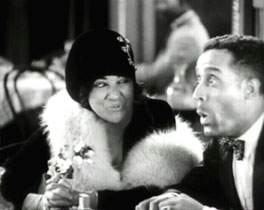 Mosby's Columbia recordings have been reissued by Jazz Oracle, & are definitely worthy of full acquaintance. Mosby's Columbia recordings have been reissued by Jazz Oracle, & are definitely worthy of full acquaintance.
Permanent Williams (Edward Thompson) co-owns the club with his wife Jonquil, played by Evelyn Preer. Preer & Thompson were real-life husband & wife, having married while on the road with that branch of the Lafayette Players who journeyed through the South.
Preer's first film roles were in Oscar Mischaux's The Homesteader (1919) & the horrifying controversial drama Within Our Gates (1919), the year before she joined the Lafayette Players.
Called black America's "first lady of the silver screne," she had "cross over" success on stage (including Broadway), screen, & cabarets when she was vocalist for such bandleaders as Duke Ellington, Eubie Blake & Red Nichols (some of her Hollywood work included uncredited performances which were lipsynched by white actresses who couldn't sing).
With her broad, flat nose, she was the first & for a long while only screen beauty who did not have to possess white features to be embraced by white as well as black theater-goers.
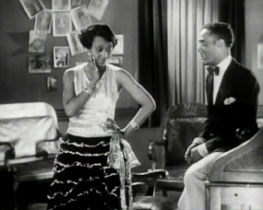 She alas died young, shortly after her final role as Lola in the von Sternberg-directed Marlene Dietrich vehicle Blonde Venus (1932), from complications of pneumonia after giving birth to her & Thompson's daughter. She alas died young, shortly after her final role as Lola in the von Sternberg-directed Marlene Dietrich vehicle Blonde Venus (1932), from complications of pneumonia after giving birth to her & Thompson's daughter.
Her funeral was one of the biggest Hollywood had until then experienced, & radio & newspapers reported it nationwide.
In Melancholy Dame, scenes with Preer & Thompson really look like the make-up department used some skin dye to darken them up. After five movies with Christie's studio, Preer broke her contract because the black-face make-up deeply angered her.
Jonquil alas is needlessly jealous of Sapho, who had been Permanent's first wife though she's now in love only with Webster.
Permanent & Sapho had apparently had a dance act in the past, & they look good when Permanent leaps up to join in the floor show.
Seeing them dance together so well, Jonquil can't help believing what she believes.
She demands the Sinful Syncopaters be fired, to get Sapho out of the place. But the club's only been profitable because of the band, & Permanent balks at sabotaging the club.
The two women become locked in a battle of wills, with the promise of violence & mayhem building up to a joke told instead. Really very nicely played.
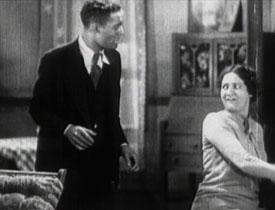 Behind the opening credits for The Framing of the Shrew (1929) has four black guys doing harmonizing as a straightforward barbershop quartet, with no sign of the Mills Brothers or gospel harmony tossed in.
Behind the opening credits for The Framing of the Shrew (1929) has four black guys doing harmonizing as a straightforward barbershop quartet, with no sign of the Mills Brothers or gospel harmony tossed in.
In the previous films the opening-credits numbers were jazz, which black-cast stage musicals made de rigour for black-cast films right from the beginning of sound.
One can't help but suppose that among the many innocent rebellions among actors in these white productions, showing that black singers could do old-timey barbershop was an in-joke, providing a moment of amusement for the politically aware & sophisticated Lafayette Players.
A domestic dispute starts off the tale as Clarry Boson (Evelyn Preer) tosses stuff at her husband Privacy Robson (Edward Thompson), while from the street the barbershop boys are witness to Privacy's dressing down.
Florian Slappey (this time played by Charles Olden) gives Privacy a few pointers on how to become the boss of his own house, starting with advice to threaten divorce, though not inclulding having to go through with it once a lawyer (Clarene Williams) gets involved.
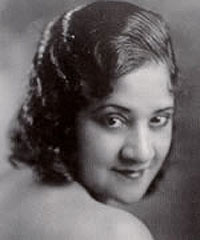 Instead of getting meak over being threatened, Clarry gets meaner. She then sits down at the piano & busts out a tough bit of blues: Instead of getting meak over being threatened, Clarry gets meaner. She then sits down at the piano & busts out a tough bit of blues:
"He can leave/ I won't grieve/ Got a joker up my sleeve/ Ain't no man can me a fool out of me..."
Privacy keeps taking Florian's advice, getting himself deeper & deeper in doo. He goes so far as to arrange a date with Miss Mallissie Cheese (Robert Hyson) to drum up some jealousy, inducing a visit from the undertaker wondering if he's about to have a new client.
Clarry's especially hurt when Privacy claims not to like her cooking, a part of their homelife at which she in fact excells. Eventually Clarry breaks down & agrees to become a vertable servant to her husband. This struck me as an unfortunate climax to an otherwise wonderful two-reeler.
Thomas Cripps, a leading authority of "race films," writing the modern assessment of Framing of the Shrew noted, "What was burlesque in 1929 has become aİpiece of folk art." Fond as I am of black-cast films I'm glad to see it regarded as a folk art instead of just a slap in the face of African America.
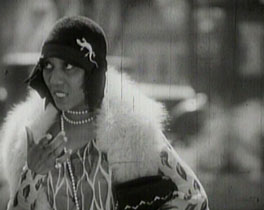 The song behind the opening credits to Oft in the Silly Night (1929) is sung by Roberta Hyson & Edward Thompson, & runs in part: "Every man's a big surprise/ Ain't that nice/ You're the kind of man that I've been needin'/ You're just the one for my Garden of Eden..."
The song behind the opening credits to Oft in the Silly Night (1929) is sung by Roberta Hyson & Edward Thompson, & runs in part: "Every man's a big surprise/ Ain't that nice/ You're the kind of man that I've been needin'/ You're just the one for my Garden of Eden..."
Temus Robinson (Thompson) is a working class stiff who chauffeurs the wealthy young Mezanine Connor (Hyson), daughter of the undertaker Julip Connor (Arthur T. Ray).
There is so much talent invested in these two-reel comedies, but for me the stand-out greatest is Roberta Hyson, & a bloody shame she didn't have a bigger film career beyond a handful of Al Christie productions, only one of which was feature length.
The collective impression one gets from the Darktown films is that she can do it all, comedy, drama, jazz singer, dancer, & for all her sexy beauty, projecting a girl-next-door sweetness.
I can get really peevish if I think too long about the fact that it does so little good to try to track down more of her films, because she made far too few. Not only was she denied a larger film career, but now, today, I'm denied the chance to see more of her work.
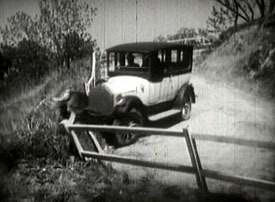 She actually lost roles because of her perfect diction, in a casting environment that preferred performers who could capture idiotic "dialect" in dialogue concocted by white writers whose model was Uncle Remus. She actually lost roles because of her perfect diction, in a casting environment that preferred performers who could capture idiotic "dialect" in dialogue concocted by white writers whose model was Uncle Remus.
As a singer, however, she did have a vaudeville & radio career through the '30s, with her sweetheart Sam "Deacon" McDaniel's band (Sam was Oscar winner Hattie MacDaniel's brother).
They starred on a show called Optimistic Do-Nuts originated on KNX out of Los Angeles. Sam scored many films in the '30s, & chances are good Roberta's voice is heard on a few soundtracks, as uncredited singers often helped less talented white actresses fake being singers.
Temus is secretly in love with Mezanine & she just as secretly cares for him. Only the class barrier stands between them.
Temus gets his pal Eli Rubb (Spencer Williams) to help with a bit of a masquerade. Eli poses as Temus's chauffeur, borrowing the Connor family limousine. Temus in borrowed tuxedo attends the high society dance.
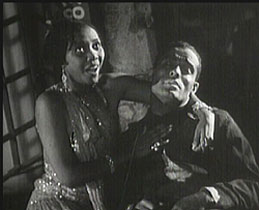 But when Mezanine sees her car with a driver in the parking lot, she assumes it's Temus in the driver's seat. She'd rather be with Temus than attend the ball, so she jumps in the back asking to be driven out to the country, calling Eli "Honey" thinking the guy in the chauffeur cap is Temus. But when Mezanine sees her car with a driver in the parking lot, she assumes it's Temus in the driver's seat. She'd rather be with Temus than attend the ball, so she jumps in the back asking to be driven out to the country, calling Eli "Honey" thinking the guy in the chauffeur cap is Temus.
Eli's so surprised, he keeps his face turned away & drives off as ordered. But in his panicked state of mind, he's not far down the road before he flips the limousine on the side of the road. Convinced he killed Mezanine, he runs off to find Temus.
Temus arrives at the scene to pretend he'd been driving the whole time. Mezanine of course is perfectly all right, though each momentarily believes the other was killed. While discovering no one got hurt, they reveal their love for one another, a very sweet end.
Henry T. Sampson, author of Blacksİin Black & White: A Source Book on BlackİFilms (2nd edition, 1995) declared the Darktown comedies "well done &İwellİwritten," warning only that they be viewed "in the context of the times." That's as simple & factual an assessment as could be hoped for. And an opportunity to see stage actors of the Harlem Renaissance at work is fortunate to extreme.
Additional black-cast talkies from 1929 include Duke Ellington's Black & Tan, & Bessy Smith's St. Louis Blues
copyright © by Paghat the Ratgirl
|
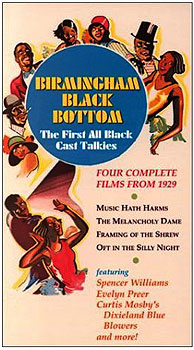
 Each film purports to be set in a neighborhood of Birmingham, Alabama, & feature a very quickly recognizable acting troupe whose members take turns at starring roles & support roles through the four films.
Each film purports to be set in a neighborhood of Birmingham, Alabama, & feature a very quickly recognizable acting troupe whose members take turns at starring roles & support roles through the four films. The Lafayette Players were a serious part of the Harlem Renaissance. They were founded in the 'teens with the express purpose in mind of showing black actors doing serious theater.
The Lafayette Players were a serious part of the Harlem Renaissance. They were founded in the 'teens with the express purpose in mind of showing black actors doing serious theater.
 He's got a major crush on Zenia Sprowl (Hyson) who hopes to set herself up in a beauty shop business if she can raise five hundred dollars to get started.
He's got a major crush on Zenia Sprowl (Hyson) who hopes to set herself up in a beauty shop business if she can raise five hundred dollars to get started. Florian is a recurring character in the Octavus Roy Cohen's Darktown short stories, & not invariably a bad guy, more of a well-dressed dandy, man-about-town, & even occasionally a private detective. But for this tale he serves as a mild sort of villain.
Florian is a recurring character in the Octavus Roy Cohen's Darktown short stories, & not invariably a bad guy, more of a well-dressed dandy, man-about-town, & even occasionally a private detective. But for this tale he serves as a mild sort of villain. Mosby's Columbia recordings have been reissued by Jazz Oracle, & are definitely worthy of full acquaintance.
Mosby's Columbia recordings have been reissued by Jazz Oracle, & are definitely worthy of full acquaintance. She alas died young, shortly after her final role as Lola in the von Sternberg-directed Marlene Dietrich vehicle Blonde Venus (1932), from complications of pneumonia after giving birth to her & Thompson's daughter.
She alas died young, shortly after her final role as Lola in the von Sternberg-directed Marlene Dietrich vehicle Blonde Venus (1932), from complications of pneumonia after giving birth to her & Thompson's daughter.
 Instead of getting meak over being threatened, Clarry gets meaner. She then sits down at the piano & busts out a tough bit of blues:
Instead of getting meak over being threatened, Clarry gets meaner. She then sits down at the piano & busts out a tough bit of blues:
 She actually lost roles because of her perfect diction, in a casting environment that preferred performers who could capture idiotic "dialect" in dialogue concocted by white writers whose model was Uncle Remus.
She actually lost roles because of her perfect diction, in a casting environment that preferred performers who could capture idiotic "dialect" in dialogue concocted by white writers whose model was Uncle Remus. But when Mezanine sees her car with a driver in the parking lot, she assumes it's Temus in the driver's seat. She'd rather be with Temus than attend the ball, so she jumps in the back asking to be driven out to the country, calling Eli "Honey" thinking the guy in the chauffeur cap is Temus.
But when Mezanine sees her car with a driver in the parking lot, she assumes it's Temus in the driver's seat. She'd rather be with Temus than attend the ball, so she jumps in the back asking to be driven out to the country, calling Eli "Honey" thinking the guy in the chauffeur cap is Temus.